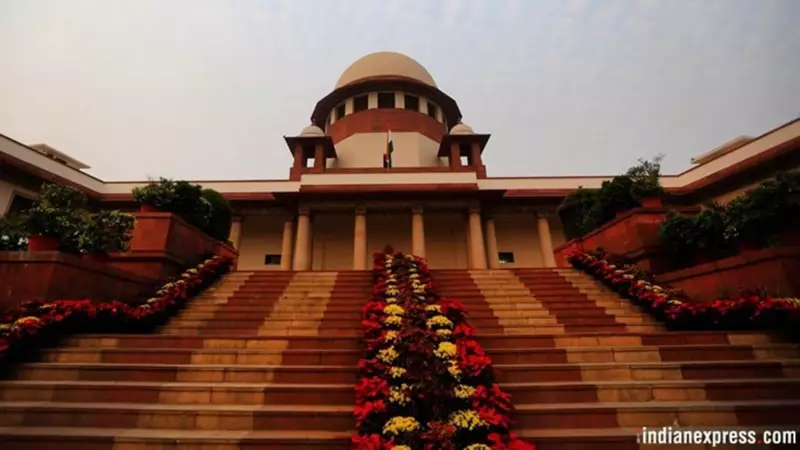
Supreme Court Reverses Stance on Retrospective Environmental Approvals
In a significant 2-1 verdict that has sparked intense debate, the Supreme Court on Tuesday recalled its own May 16 judgment that had struck down the Central government's notification permitting ex post facto environmental clearance for projects. The majority decision emphasized protecting public resources worth nearly Rs 20,000 crore, while the dissenting judge warned this move undermines fundamental environmental principles.
The Split Verdict and Judicial Positions
The bench comprising Chief Justice of India B R Gavai and Justices K Vinod Chandran and Ujjal Bhuyan delivered the divided ruling. While Chief Justice Gavai and Justice Chandran supported recalling the earlier judgment, Justice Bhuyan strongly dissented, stating the majority decision "overlooks the very fundamentals of environmental jurisprudence" and represents "a step in retrogression."
The matter will now be placed before the CJI for further proceedings, marking another chapter in the ongoing legal battle between development priorities and environmental protection.
Massive Public Investments at Stake
The court was informed about substantial public investments hanging in balance due to the May 16 verdict. At the Central level, 24 projects involving expenditure of Rs 8,293 crore were awaiting environmental clearance, while at the state level, 29 projects worth Rs 11,168 crore remained pending.
These included critical infrastructure projects such as the 962-bed AIIMS Medical College and Hospital in Odisha and the greenfield airport in Vijayanagar, Karnataka. Several common effluent treatment plants were also among the projects seeking post facto clearance.
Writing for the majority, CJI Gavai expressed grave concern about the consequences of maintaining the May 16 ruling. "If the May 16 judgment is not recalled, it will result in demolition of various buildings/projects constructed out of public exchequer to the tune of nearly Rs 20,000 crore," he stated.
Legal Reasoning and Precedents Cited
The majority judgment identified procedural flaws in the May 16 ruling, noting it had failed to adequately consider three previous Supreme Court verdicts by two-judge benches that held post facto environmental clearance was not impermissible. These included:
- The 2021 ruling in Electrosteel Steels Ltd vs Union of India
- The March 2022 decision in Pahwa Plastics Pvt Ltd vs Dastak NGO
- The September 2022 ruling in D Swamy vs Karnataka State Pollution Control Board
"It is thus clear that though this Court held that ex post facto EC should not ordinarily be granted, but in exceptional circumstances they can be granted," the majority verdict stated. "It has been categorically held that the Environment Protection Act does not prohibit ex post facto EC."
The majority emphasized that the two-judge bench delivering the May 16 ruling should have referred the matter to a larger bench since earlier decisions were also by benches of co-equal strength.
The Strong Dissenting Voice
Justice Bhuyan's dissenting opinion presented a fundamentally different interpretation of environmental law. He argued that the concept of ex post facto environmental clearance is "in derogation of the fundamental principles of environmental jurisprudence" and "completely alien to environmental jurisprudence."
Referring to the 2017 Common Cause v. Union of India and 2020 Alembic Pharmaceuticals Ltd. v. Rohit Prajapati & Ors cases, Justice Bhuyan stated that subsequent judgments in Electrosteel, Pahwa and D. Swamy had not followed binding precedent and were "clearly hit by the principle of per incuriam."
Justice Bhuyan also questioned the petitioners' standing, noting the review petition was filed by builders and developers who had started projects without environmental clearance. "Beyond this, no other particulars are available: as to when the members had started their respective projects; whether each project required prior EC; or whether expansion of the projects required EC," he observed.
Broader Environmental Implications
The minority judgment made a poignant reference to Delhi's air pollution crisis, stating "the deadly Delhi smog reminds us everyday about the hazards of environmental pollution." Justice Bhuyan emphasized that the Supreme Court has a constitutional duty to safeguard the environment and cannot be seen "backtracking on the sound environmental jurisprudence that has evolved in this country."
He criticized what he called a "false narrative pitting environment against development," asserting that "ecology and development are not adversaries" and both are part of the constitutional construct of sustainable development.
The dissenting judge particularly emphasized that "precautionary principle is the cornerstone of environmental jurisprudence" and cannot be sidelined by relying solely on the polluter pays principle, which he described as merely "a principle of reparation."
Background and petitioners
The review petition was filed by the Confederation of Real Estate Developers of India (CREDAI) along with applications by the Steel Authority of India (SAIL) and the State of Karnataka. They sought review of the May 16 verdict in Vanashakti vs Union of India, delivered by a bench of Justices A S Oka and Ujjal Bhuyan. Justice Oka has since retired.
The May 16 ruling had also struck down a 2021 Office Memorandum issued in pursuance of the 2017 notification that allowed retrospective environmental clearances.
The Supreme Court's decision to recall its own judgment sets the stage for further legal proceedings and continues the important national conversation about balancing environmental protection with developmental needs.





